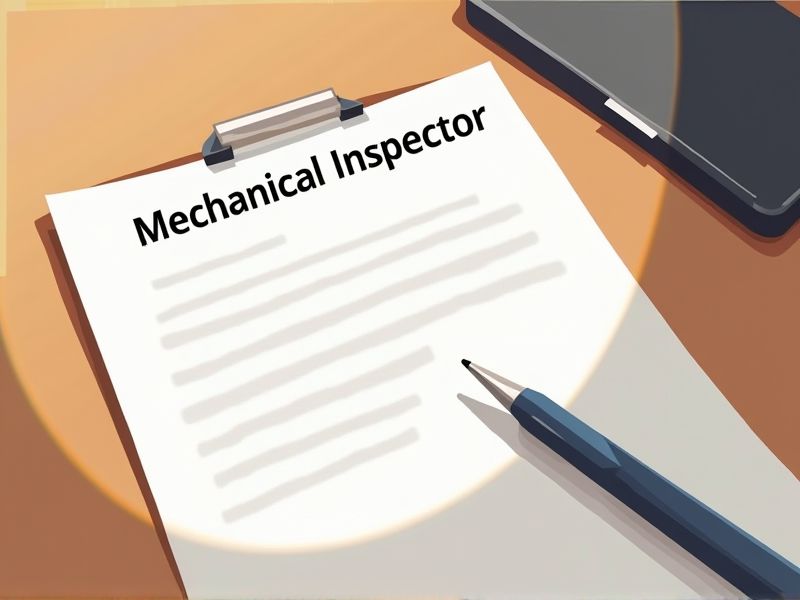
Mechanical Inspectors play a crucial role in ensuring safety and compliance within mechanical systems, which directly affects operational reliability and public safety. Certifications provide a standardized framework for assessing the knowledge and skills required to identify and rectify potential mechanical deficiencies. Employers and industries rely on these certifications to validate an inspector's expertise, ensuring that inspections meet legal and quality standards. Here are some key certifications essential for a Mechanical Inspector.
Certified Welding Inspector (CWI)
A Certified Welding Inspector (CWI) ensures that welds meet the strict quality standards crucial for structural integrity and safety in mechanical systems. Their expertise aids in identifying potential defects and flaws in welding work, which can prevent costly repairs and safety hazards. Having a CWI in a mechanical inspection role increases confidence in the longevity and durability of engineered structures and components. Reliable quality assurance provided by a CWI supports compliance with industry regulations and standards, thereby minimizing risks and enhancing project reliability.
API 510 Pressure Vessel Inspector Certification
API 510 Pressure Vessel Inspector Certification ensures that mechanical inspectors have the necessary knowledge and skills to assess pressure vessels' integrity and safety, minimizing the risk of failure. Certification aligns with industry standards, promoting uniformity in inspection practices and maintaining quality assurance. Inspectors holding this certification demonstrate a commitment to professional development, which can enhance credibility and career advancement opportunities. Regulatory bodies and employers often require this certification to comply with legal and safety regulations, ensuring that inspectors can effectively contribute to the safe operation of facilities.
API 570 Piping Inspector Certification
API 570 Piping Inspector Certification enhances a mechanical inspector's credibility by validating their expertise in piping systems. Certification provides the mechanical inspector with the knowledge to ensure safety and compliance with industry standards, which reduces the risk of failures. Possessing the API 570 certification aids in accurate assessments during inspections, boosting reliability in maintenance and operational decisions. Employers often seek certified professionals to mitigate risks and improve the efficiency of maintenance and inspection processes.
API 653 Storage Tank Inspector Certification
Obtaining the API 653 Storage Tank Inspector Certification validates a mechanical inspector's competence in inspecting and maintaining storage tanks. Certification ensures adherence to industry standards, reducing the risk of tank failures. With this certification, inspectors can identify potential issues, thereby enhancing safety and operational efficiency. Demand for certified inspectors increases as industries face stricter regulatory pressures.
ASNT Level II Non-Destructive Testing (NDT) Certification
Possessing an ASNT Level II NDT Certification allows a Mechanical Inspector to accurately evaluate material integrity, reducing the risk of structural failure. This certification ensures the inspector has met national standards for competency in assessing potential defects in materials without causing damage. Companies often require this qualification to comply with industry regulations and quality assurance programs. Having the certification enhances the inspector's credibility and job prospects in competitive fields requiring precision and safety.
NACE Coating Inspector Certification
Mechanical inspectors need the NACE Coating Inspector Certification as it ensures they possess a thorough understanding of protective coatings, which are critical in preventing equipment degradation. Without this certification, inspectors might miss early signs of corrosion or coating failures, leading to costly repairs and downtime. With growing industry standards, certified coating knowledge enhances credibility and trust with clients and employers. As industry regulations tighten, certification can also be a competitive advantage in job markets.
NICET Certification in Mechanical Inspection
Obtaining NICET Certification in Mechanical Inspection ensures that a mechanical inspector possesses the necessary technical knowledge and skills to accurately assess mechanical systems. This certification validates an inspector's expertise, leading to higher trust and credibility in their evaluations. Certified inspectors are more likely to adhere to industry standards and best practices, minimizing safety risks in mechanical installations. Employers often require or prefer NICET certification, which can enhance career opportunities and advancement in the field.
Certified Quality Inspector (CQI)
A Certified Quality Inspector (CQI) ensures that mechanical components meet rigorous quality standards, reducing the likelihood of defects and failures. By identifying issues early in the production process, CQI professionals help minimize costly rework and downtime. Their expertise contributes to maintaining compliance with industry regulations and certifications, which is crucial for product safety and market acceptance. As mechanical systems become increasingly complex, having a CQI helps bridge the gap between design intentions and manufacturing realities.
Fundamentals of Engineering (FE) Certification
Obtaining a Fundamentals of Engineering (FE) certification establishes a foundation of engineering principles, which enhances the credibility and competency in technical assessments required for a Mechanical Inspector. Passing the FE exam indicates a standard level of knowledge and proficiency in engineering that benefits the understanding of complex mechanical systems and components. Employers often prefer certified individuals, as it provides assurance of their skills and capabilities in inspecting mechanical systems. The certification acts as a stepping stone towards becoming a Professional Engineer (PE), which may be required for higher-level inspection roles and responsibilities.
Professional Engineer (PE) License
The Professional Engineer (PE) License ensures that a Mechanical Inspector possesses the requisite expertise and knowledge to uphold industry codes and standards, leading to safer practices. With the PE License, Mechanical Inspectors gain credibility and trustworthiness, which increases client confidence and professional recognition. Regulatory bodies often mandate a PE License for specific roles to ensure compliance and oversight, reducing potential liabilities. By holding a PE License, a Mechanical Inspector can independently sign off on projects, facilitating seamless project development and enhancing career opportunities.
Summary
As a Mechanical Inspector gaining certifications, you can expect enhanced credibility and career advancement opportunities. This recognition often leads to increased trust from employers and potential for higher earnings. Your ability to ensure compliance with industry standards improves significantly, reducing workplace risks. Receiving certifications also opens doors to diverse roles and projects, broadening your professional scope.
